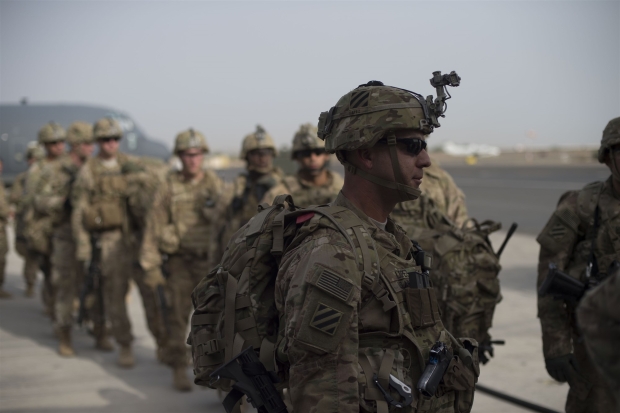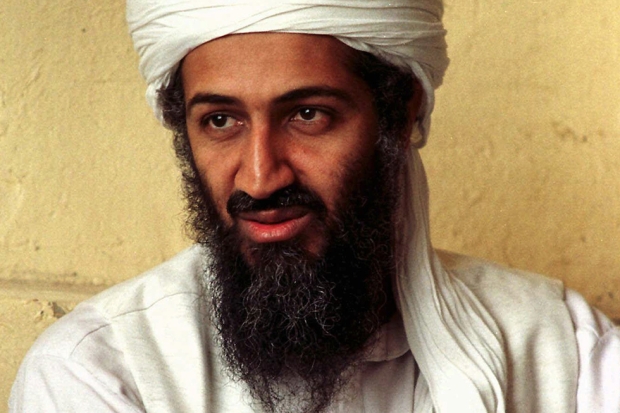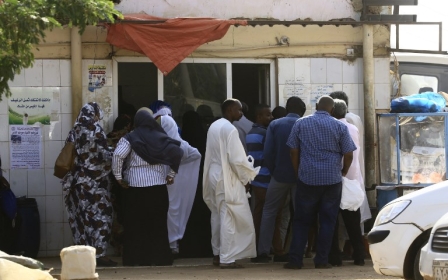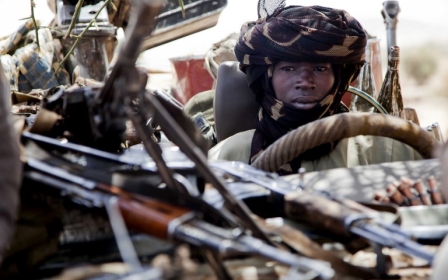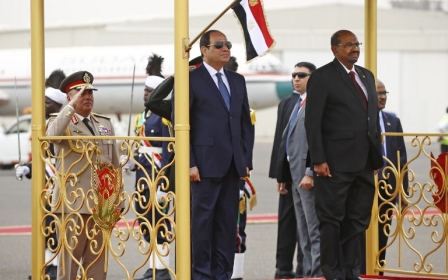Sudan warms to Washington even as defiant Bashir berates US meddling
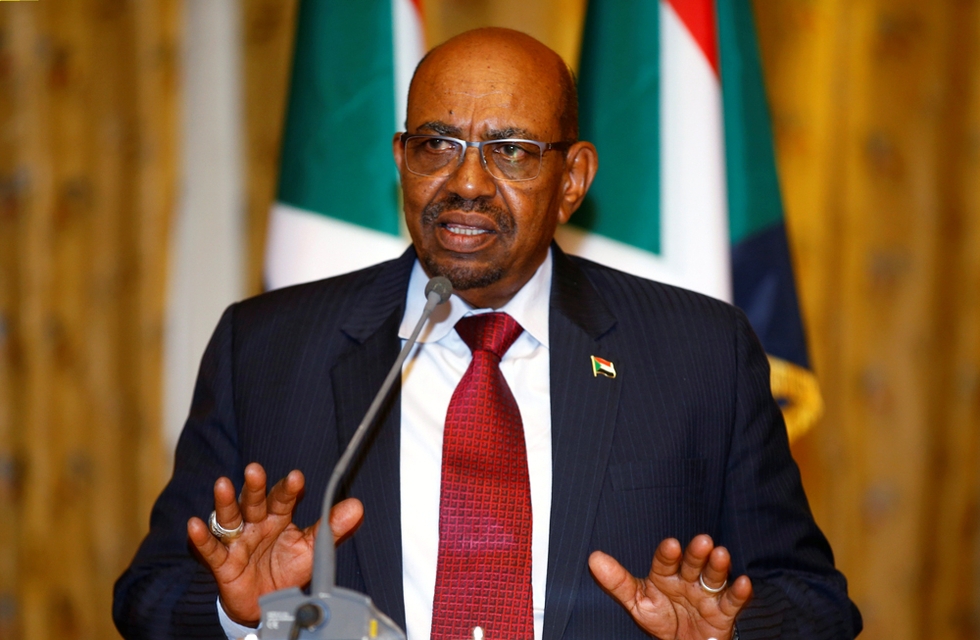
KHARTOUM - Sudan's government is ready to work more closely with the United States on regional security issues in a bid to persuade Washington to take it off its terrorism blacklist, a diplomat in Khartoum has told Middle East Eye.
Despite signs of a growing willingness in Washington to bring Khartoum in from the cold after more than two decades of mutual antagonism, Sudanese President Omar al-Bashir has remained publicly defiant about the state of the relationship between the two countries.
Al-Dirdiri Mohamed Ahmed, Sudan's foreign minister, visited the US last month, with the State Department saying it was prepared to begin the process of rescinding Sudan's decades-old status as a state sponsor of terrorism.
There are some conditions attached to this offer, with changes in Sudanese policy desired in six key areas.
These include "expanding counterterrorism cooperation," improving human rights in regard to freedom of religion and the freedom of the press, and "ceasing internal hostilities" with rebel groups in the restive regions of Darfur, Blue Nile State and South Kordofan.
The announcement was made as part of what the State Department called a "Phase II framework for bilateral engagement," following the lifting of economic sanctions on Sudan by the US last year.
But in a speech a few days later, Bashir struck a more hostile tone and accused the US of meddling in Sudanese affairs.
"We wouldn't kneel or prostrate to anyone except Allah ... Sudan is the country being most targeted and fought against because of its adherence to sharia and its independence," Bashir told an event to mark the 29th anniversary of the establishment of the government's Popular Defence Forces (PDF) paramilitary unit.
Public face, private face
Some analysts see a growing contradiction between Bashir's anti-American public statements and the quiet back-channel diplomacy that also saw the head of the country's armed forces welcomed at a counter-extremism conference for military chiefs in Maryland in October.
Suliman Baldo, an analyst at the US-based Enough Project think tank, which has called for Sudan to remain on the terrorism list, said Bashir's speech indicated that he had no intention of making any real concessions to the US.
"Such statements weaken Sudan's negotiating position and lead to questioning the seriousness of the regime in the bilateral negotiations with the US administration," he told Dabanga, a Darfur-based opposition radio station.
Baldo also pointed out that Bashir had met Russian President Vladimir Putin shortly after economic sanctions were lifted last year. The leaders met in the Black Sea city of Sochi, with Bashir asking Putin to protect Sudan from the "aggressive acts of the United States".
But the diplomat in Khartoum, speaking on condition of anonymity because he is not authorised to speak to the media, told MEE that the government was prepared to work closely with the US in all areas necessary, in order to have normal relations restored.
"Khartoum has widely engaged with Washington regarding the war on terrorism and is still open to going forward in this, as well as on the other tracks of regional stability regarding South Sudan and Libya," he said.
"But the response of the United States is still weak despite the start of the second phase talks between the two sides."
The latter demand is a reference to multimillion-dollar claims by US citizens against Sudan on the grounds that it is alleged to have provided material support to al-Qaeda for bomb attacks targeting the US embassies in Nairobi and Dar es Salaam in 1998 and the attack on the USS Cole warship in Yemen in 2000.
Sudan hosted Osama bin Laden between 1991 and 1996 when the Saudi al-Qaeda leader was establishing the militant network, and the Sudanese government benefited from business contracts and investment brought into the country by bin Laden.
'State sponsor of terrorism'
The US designated it a state sponsor of terrorism in 1993, and Sudanese government officials have repeatedly said that removal from the blacklist is a necessary step for the economically crippled country, which has debts estimated at $50bn, to gain access to the global economy and banking system.
Washington's latest engagement with Bashir, long considered a pariah by Western nations and still the subject of an International Criminal Court arrest warrant relating to atrocities committed by pro-government forces in Darfur, comes with his government already exerting influence on a range of regional issues.
In its annual terrorism report last month, which upheld Sudan's status as a state sponsor of terrorism, the US State Department acknowledged that Sudanese forces were performing an important security role and working with the US on counter-terrorism operations along the country's border with Libya.
"The Government of Sudan continued to pursue counterterrorism operations alongside regional partners, including operations to counter threats to US interests and personnel in Sudan," it said.
"As part of the government's counterterrorism strategy, Sudanese forces patrol the Sudanese-Libyan border to interdict the flow of suspected terrorists transiting through the region, and to prevent arms smuggling and other illicit activities."
Suggesting that further support for the country was necessary, it also said: "Sudan's expansive size, and the government's outdated technology and limited visa restrictions, presented challenges for border security."
The country has also received funding from the European Union for border patrols aimed at stemming the flow of migrants and refugees trying to reach Europe from the southern shores of the Mediterranean.
It has contributed soldiers to the Saudi-led coalition waging a controversial war in Yemen, including to the fight against Houthi rebels in Hodeidah, and hosted peace talks between the rival sides in South Sudan's five-year civil war.
Last week, Khartoum hosted Ghassan Salame, the United Nations Secretary-General’s special envoy for Libya, for a conference also attended by foreign ministers from regional countries and representatives from France, Italy, the Arab League, the European Union and the African Union to discuss instability in southern Libya.
Sudanese Foreign Minister Ahmed said participants had agreed on the need to find a political solution to the crisis and rejected external military intervention in the country.
“The ministers have reiterated their commitment to help Libya to maintain its unity, to maintain the December 2015 peace agreement [which created the Government of National Accord], to encourage a political solution and inclusive dialogue, and refuse any military solution,” he said.
“The neighbouring countries will pay close attention to the situation in Libya and coordinate closely to fight terrorism, transnational crime, illegal migration and human trafficking.”
Agreement with FBI
Khartoum and Washington are reported to be working together in other ways too.
In early November, the Sudanese government approved the signing of a counter-terrorism cooperation agreement between the interior ministry and the Federal Bureau of Investigations (FBI), the Sudan Tribune reported.
Last month, Khartoum was reported to have provided intelligence which led to a US air strike against the al-Shabaab militant group in Somalia, which the US military said killed at least 60 fighters.
After attending the Counter Violent Extremist Organizations Chiefs of Defense Conference at a US military base in Maryland in October, Sudanese Chief of General Staff Kamal Abdel-Marouf said he had proposed to the conference that Sudanese rebel groups should be listed as a "source of terrorism".
An African diplomat who also attended the meeting, speaking on condition of anonymity, told MEE that some African countries had proposed the designation of Sudanese rebels as terrorists, but that US officials had only promised to study the idea.
Fathi Aldaw, a political analyst, told MEE that he believed the US was exploiting Khartoum's desperate need to end its international isolation and tackle its economic crisis in order to extract ever greater cooperation on security and intelligence issues.
He said Sudan's government had been cooperating with the CIA since 1996, three years after the country was designated as a state sponsor of terrorism and a year before Washington imposed full economic sanctions.
The US embassy in Sudan's website also describes Sudan as providing "concrete cooperation against international terrorism" since the 9/11 al-Qaeda attacks in New York and Washington in 2001.
"Khartoum began intelligence cooperation with Washington in 1996 when it opened its doors to the CIA, providing valuable information about the terrorist groups, handing over many radical groups and leaders to their governments," said Aldaw.
"The Trump administration is very erratic. It only understands the pragmatic language of interests, and doesn't care for the value of human rights," he said.
New MEE newsletter: Jerusalem Dispatch
Sign up to get the latest insights and analysis on Israel-Palestine, alongside Turkey Unpacked and other MEE newsletters
Middle East Eye delivers independent and unrivalled coverage and analysis of the Middle East, North Africa and beyond. To learn more about republishing this content and the associated fees, please fill out this form. More about MEE can be found here.


